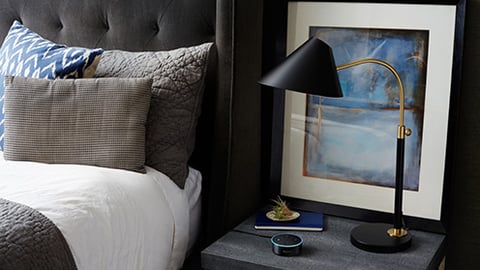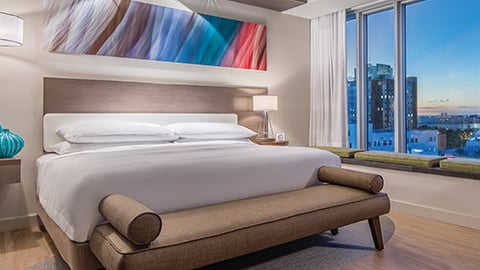Hotel of the Future
The hotel of the future already exists. Advanced technology is available and becoming more affordable, so the only question is: When will adoption and implementation rates hit a tipping point? Today’s hotels straddle a fine line between high-touch service and high-tech components. The best technology needs to be both invisible and impactful. Hotel technology has the added pressure of needing to deliver on service and experience while reinforcing the high-touch tenets of hospitality.
A major challenge hotels face is the diminishing influence of brands as price-beating OTAs and alternative lodging such as Airbnb divert potential guests’ attention. While brands are important, they are becoming a commodity. The top four global hotel companies have 84 hotel brands combined, and it is not easy for consumers to identify with and remain loyal. John Spencer, global industry leader, hospitality, Accenture, says this has impacted the industry in significant ways. The shift across all major hoteliers to exit asset ownership models has impacted the largest hotel companies’ ability to influence because they no longer own the real estate. It has also extended time to deploy new capabilities because they have less influence in this asset-based model.
“Hotels need to draw upon brand recognition that allows you to draw distinction,” Spencer says. “People often equate loyalty to the program that has been set up, but real loyalty is understanding your customer and how they use the brand while there.”
With the explosion of brands, this concept of loyalty insight is even more vital. Deloitte reports that one in four travelers allocate more than 75% of their share of wallet to their preferred hotel brand. Successful future-ready hotels will need to master this and be nimble enough to deliver consistency in service delivery, intuitiveness and ease of use for guests however that may manifest itself in consumer demands.
Gustaaf Schrils, CIO, White Lodging believes that truly frictionless transactions will require the combination of biometrics, voice recognition, artificial intelligence (AI), machine learning and blockchain.
“The iPhone X already uses facial recognition for login; Siri is responding to voice prompts; Alexa is completing orders and transactions,” he says. “Why not elevator floor selection, opening of room doors, adjust temperature, close curtains, put on music or select a TV program? Why not have guest-facing associates use technology that enables them to greet guests by name, know their value to the brand, and know their preferences?”
Powering Potential
Many hotel companies are only scratching the surface of the technology potential that is available. What is in use today is the basis for how to create personalized, seamless experiences, but as the hotel industry continues to increase its use cases for everything from artificial intelligence (AI) to virtual reality to smart televisions and interactive signage, hotel infrastructure must evolve to support it all.
Bill Lally, president of Mode:Green, a hospitality integration firm, says brands are often victims of value engineering. Brands that wish to innovate hit resistance from owners who don’t see how that translates into higher booking rates. “Hotels struggle with how to keep experiences and technologies in hotels that will keep the brand edgy, while putting a financial wrapper on it that proves there is value-add,” he says.
“With rapidly evolving technology, the demand for capital always exceeds supply and that is where value engineering comes in,” Schrils, states. “Technology must be more stable than shiny; must enhance guest experience, not just automate processes; and must deliver a total solution to a problem, not a piecemeal component to a solution.”
Having an integrated network of systems will enable hotels to build and foster the necessary connections to guests in order to cater to their requests and predict needs. Johnathan Capps, vice president of revenue, Charlestowne Hotels, sees intrigue from guests regarding artificial intelligence fueling adoption. Home electronics are setting the pace for hotel technology, and there is now a need for lodging to catch up. LG is leveraging its reach into the smart home space to bring hotels new smart features with advanced in-room voice assistant compatibility and futuristic display technology designed to promote in-room connectivity. As smart technologies are being adopted in the home at a meteoric pace, consumers are demanding those same smart conveniences while traveling.
“Voice-controlled services will have an impact within the guest room experience. There will be integrations for hotel services, TV, AC, lighting controls available which are in beta testing now,” Darren Clark, vice president of technology, Viceroy Hotels & Resorts, says. “AI will be imbedded in everything from chatbots at booking to being your personal concierge/butler while staying at the property.”
InterContinental Hotel Group (IHG) introduced its AI Smart Room at select locations in China. Developed by Baidu’s DuerOS Platform, it offers voice technology that delivers a more natural interaction.
Currently, there is a great deal of work under way related to in-room automation to help bring the smart home concept of integrated and connected solutions into the hotel room. LG has introduced the Pro:Centric Smart platform, which allows guests to benefit from enhanced offerings — ordering room service, requesting a car, checking out through the TV — and snappy user interface (UI) performance. Smart TVs offer benefits to hoteliers because devices customize to guests’ needs marking the evolution of the hotel TV to a gateway, opening the door for AI.
Artificial Intelligence Requires Real Integration
Much of the buzz around AI revolves around automation, but Capps stresses that the compelling aspects of technologies for his company are not those that can put people out of work, but rather those that reinforce hospitality. For any AI-driven strategy to succeed, systems need to “speak” to each other first. Charlestowne Hotels recently completed the full two-way integration of its CRM and PMS platforms. With the two systems in dialogue, the goal is to use the data available to build actionable guest profiles.
“Using these insights, we can use technology in subtle ways to make impactful service encounters,” he says. “Remembering a guest’s pillow preference, sending dynamic pre-arrival upgrades, or welcoming them with a favorite cocktail at check-in. Guests get the benefit of an informed, personalized service without the feeling of invasion.”
The most impactful innovation will come around personalization and knowing guests. Before open APIs, it became very costly for hotels to integrate technologies, and as such, data across the guest journey remained siloed. With open APIs, hotels are now able to stitch the entire customer journey together to understand all the interactions they have with their guests and, in turn, improve the guest experience through personalization.
To foster an “open platform, open partnership, open connectivity” philosophy, LG has introduced a new hotel TV smart ecosystem that enables end users to work with a range of external partners, including compatibility with Amazon Alexa and the Google Assistant. LG’s voice assistant compatibility can allow guests to control other smart devices in the room, including lights, drapes or door locks.
Oracle evangelizes for open source systems, publishing its library of APIs on docs.oracle.com. The company contends its entire user interface is there, so no functionality is unavailable as an API for customers to leverage themselves how they see fit. Future-ready hotels and technology suppliers must adapt this mindset in order for the industry as a whole to move the needle in innovation.
- Word of Warning!
Hotels, Don’t Address Mobile Payment at Your Own Peril
Next-gen payments are still a pain point for hotels, and future-ready winners should push for changes. Laurent Idrac believes Western hotels should follow the innovation happening in China in the payment space. “The ecosystem created by Wechat far exceeds what Google or Apple have developed,” he says. “Payment is where we need to move the needle. A key advantage of Uber over the taxi industry is its seamless payment.”
Movenpick’s Bleeker agrees that hotels must find a way to adopt a similar ease of payment to that which Uber offers. He cautions that if hotels don’t, the OTAs will, and brands will lose another percentage of the bottom line. “It’s not cheaper to get an Uber,” Bleeker cautions, “but it’s so convenient, it wins the hearts of guests.”
More Connection, Fewer Points of Sign-On
As automation and self-service through mobile devices continue to shape guests’ interaction with hotels, Mike Dickersbach, director of IT capital, HEI Hotels, contends this will be driven by customers being accustomed to using mobile devices for most things.
“Bridging your personal life with how the business world interacts with consumers,” Dickersbach says. “Specifically, I would see a hotel room mirroring your home comforts — from TV walls encompassing the full length of the wall, allowing for on-the-fly art, programming, and anything else the guest would want. I would also see automation falling into a category of personal assistant, but whichever the guest uses at home, meaning they aren’t using the hotel’s choice for voice automation, but their own.”
Floor Bleeker, CIO, Movenpick Hotels & Resorts, envisions an evolution to where guests are in control of their own guest profile. He sees potential with blockchain for guests to create a profile, which would be compatible with different property management systems, to store their preferences.
“When the guest leaves, they take the data with them,” he says. “It will still help to make quick bookings, update details and have recognition across brands.”
Central authentication enables users to access multiple applications while providing credentials (user ID and password) only once. It also allows web applications to authenticate users without gaining access to a user’s security credentials. This enables guests to log onto the hotel’s network once and be recognized across brand locations for a more seamless, secure personalized experience.
Extrapolating this beyond the hotel network, the universal guest identifier concept is something that’s been discussed for about 10 years, according to Armand Rabinowitz, senior director of strategy & workgroups, Hospitality Technology Next Generation (HTNG), but he believes there is a new appetite for this in the hotel industry. He contends this is in part due to needing to compete better against shared lodging-type experiences and the evolution of technology. “There's going to be a greater ability to have a better picture of a guest no matter where they’re booking,” Rabinowitz says.
Michael Blake, CEO of HTNG, says the universal guest identifier concept is something the industry could see in as little as 16 to 18 months. HTNG is collaborating with International Air Transport Association (IATA) and Opentravel on standards to make messaging more universal. This will enable guests to share itineraries and allow businesses to develop products and provide offers more seamlessly between airport, hotel, airline, rental cars and trains. The capabilities and security of blockchain present a good platform for this, but Rabinowitz says it will require the collaboration of industries and associations.
“This is the first time efforts are really coming together with underlying technologies for all these verticals to talk together,” Blake says. “Guests won’t really have to do anything, but the underlying systems will need to change the way they take in messages. The reservation will include preferences from room types, flight info, rental cars, etc. so it will be more complicated.”
Engaged Employees, Engaged Guests
While guest-facing technologies get a great deal of attention, Jeff Bzdawka, senior VP global hotel technology, says that Hyatt Hotels Corp. is spending more time on colleague-facing innovation as he sees greater influence on behavioral changes that will enhance guest experiences.
“Innovate with colleagues and adapt with guests,” Bzdawka says. “More of our advancement will happen on a hotel side to drive better experiences and not forcing guests to change behavior.”
Bzdawka envisions unleashing colleagues from the front desk, providing mobile solutions and access to data to give employees the ability to enhance the guest experience. This builds off Hyatt’s technology strategy: “scale care and enable change.” Bzdawka views technology as an opportunity for the hotel to better connect to the guest.
At Charlestowne, employee-facing technology is aimed at eliminating inefficiencies so that staff can focus on interacting with guests, such as automated maintenance work orders and dynamic labor scheduling. This requires being selective about who uses the technology and when.
“Apple Watches are a great replacement to the operator-style headsets or earpieces currently in use at many hotels,” Capps says. “Front desk managers, housekeeping supervisors, and valet staff can use the device to relay information about late check-ins or ping valet about departing guests. Front desk staff, however, should be device-free and maintain eye contact with guests.”
Viceroy Hotels & Resorts are the first to utilize the Samsung Gear 3 watch with ALICE guest management software, which provides employees with a single hands-free tool to receive and respond to guest requests. The company has seen success with a deployment to its housekeeping, engineering and bellman teams and is working on phase two, which will add full voice services to the watch for employee communications.
“Our vision is to provide our employees with one hands-free device that will eliminate the need for radios and tablets,” Darren Clark, vice president of technology, states.
Pinehurst Resort & Country Club is working with Agilysys to build a housekeeping application that will increase the speed to service. Ed Nickelson, director of IT, envisions alerts and job requests automatically being sent up a chain and delivered to the appropriate person. “The workflows should be as seamless, effortless, and as hands-free as possible,” he says.
Laurent Idrac, former CIO of Accor Hotels, currently senior independent consultant for Hospitality & Services, believes that staff empowerment is the next big wave of hospitality technology. “The purpose of guest engagement solutions are not to connect guests with technology, but to engage with the hotel and staff,” he says. “The time of poorly designed employee applications must come to an end.”
- VIRTUAL REALITY: HYPE OR HERE?
Best Western credits rise in satisfaction and loyalty to virtual reality staff training. The company’s I Care Every Guest, Every Time hotel staff training program uses virtual reality and avatars to offer individual hotel consultation and training to staff to highlight tactical operational opportunities that drive guest satisfaction from the bottom up. It has been implemented brand-wide at all 2,000+ North American hotels.
“As a risk for the hotel industry that relies on business travel, I see VR/AR and holograms taking virtual meetings to another dimension.” – Laurent Idrac
“VR has the potential to actually bring back a personal touch in what could be a very high-tech environment.” – Bill Lally





